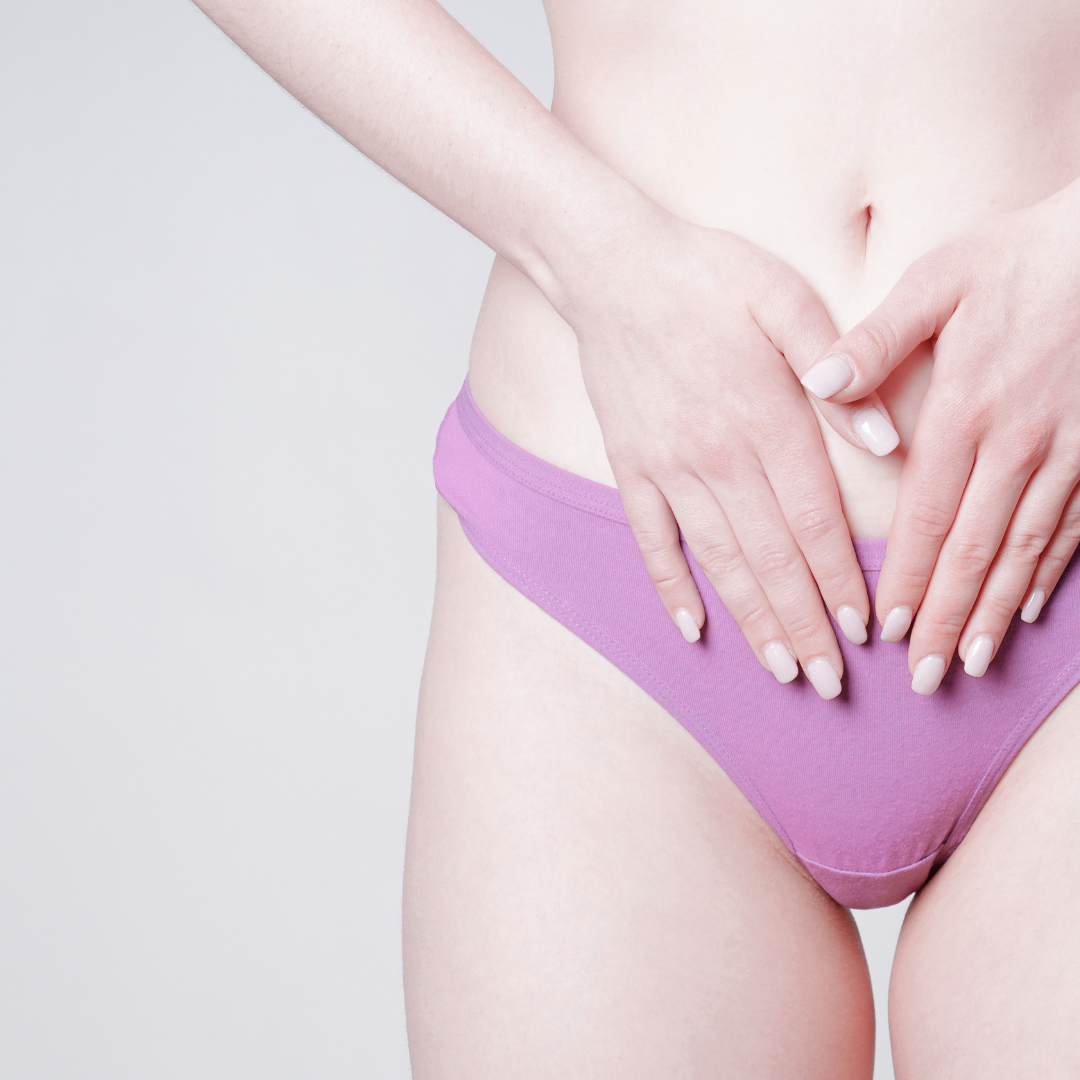
Itchy Vulva in Menopause – Causes and How to Stop The Itch
With so many menopause symptoms all being unique to each woman, some slip under the cracks because of certain taboos. That’s why so many women search for a solution to an itchy vulva in menopause online.
Here at Charlotte Hunter Nutrition, it’s all about an open space with no menopause topic being too taboo.
So, if you’re struggling with an itchy vulva in menopause, here’s why and how you can fix it.
What causes an itchy vulva in menopause?
If you’re suffering from an itchy vulva in menopause, know that you’re absolutely not alone.
In fact, vaginal itching is one of the more common symptoms of perimenopause and menopause. Sometimes, it can persist after menopause, too.
But why is vaginal itching happening?
Often, it’s down to a condition called atrophic vaginitis or vaginal atrophy. This is because the lower levels of oestrogen makes the vagina’s lining thinner and lacking of lubricant.
As with so many perimenopause and menopause symptoms, the lower levels of oestrogen can cause mayhem to your body.
Oestrogen plays a huge part in helping you to feel like yourself. While oestrogen has a wider role, it predominantly helps with your reproductive system. That said, when it’s knocked off balance, it can cause some very weird symptoms, such as itchy ears!
As your oestrogen levels dip, you may experience symptoms like hot flashes and night sweats, a change to your libido, weight gain and, of course, vaginal dryness. This dryness leads to an itchy vulva in menopause.
Other causes of vaginal itching
While vaginal itching is a common symptom of menopause and perimenopause, there are other conditions that can cause an itchy vulva. These include:
- Allergies to products such as soaps and fabric conditioners
- Bacterial vaginosis
- Yeast infections
- Trichomoniasis
- Other STIs
- Excess sweating
- Eczema
- Wearing tight clothes
How common is vaginal atrophy?
Despite an itchy vulva in menopause being very much “off the cards” for dinner conversation (though it shouldn’t be!), it’s a very common symptom of perimenopause and menopause.
In fact, at least half of women who are in perimenopause and menopause report signs of something called genitourinary syndrome of menopause, which includes vaginal dryness. This isn’t exclusive to vaginal dryness during intercourse, but also in daily life.
Vaginal dryness and itchiness is often the first sign pointing towards someone developing vaginal atrophy.
So, if you’re struggling with an itchy vulva, know that you’re one of so many women. You’re not alone.
Other vaginal symptoms of menopause and perimenopause
When your oestrogen levels decrease, you may develop vaginal atrophy. With that comes a thinner vaginal lining which loses its elasticity. Then, the vaginal canal will narrow and shorten.
Usually, the first sign of vaginal atrophy is vaginal dryness accompanied by a burning or itching in the vulva. However, an itchy vulva is not the only symptom. Vaginal atrophy can also cause:
- Yellow discharge
- Bleeding or spotting
- The sensation of pressure
- Burning and itching
- Vaginal dryness
- A change to your vagina’s acid balance
- Pain during sex (dyspareunia)
- Frequent need to urinate
- Incontinence
- Frequent UTIs
If you’re living with any of these symptoms, it’s important to speak with your doctor.
Itchy vulva in menopause – solutions
If you’re experiencing an itchy vulva in menopause or perimenopause, there are some home remedies and simple swaps you can make to reduce the itch and provide relief.
1. Use a gentle cleanser
Even before perimenopause and menopause, so many women find that perfumed products can cause irritation to the skin and vagina.
These products include bubble baths and bath bombs, scented oils, perfumed soaps, feminine sprays and deodorants.
If you’ve had sensitive skin in the past, menopause skin is even more delicate. So, make sure you avoid perfumed products. Instead, use fragrance-free products.
2. Use products made for sensitive skin
On top of avoiding perfumed items, opt for sensitive skin speciality products. Itchy vulva in menopause and other vulva issues will be heightened if your skin is sensitive to fragrance.
This applies, too, to your detergent, specifically when washing your underwear.
Talking of underwear! If you have an itchy vulva in menopause or perimenopause, you’re going to want to wear knickers made of 100% cotton. Swap anything made from nylon or synthetic fibres as they can trigger vaginal itching and make you even more sensitive.

3. Take an “oatmeal bath”
Look for oats that have been grounded and blended into a powder, known as colloidal oatmeal.
This can help with dehydrated skin and itchiness. Plus, studies have suggested that as an ingredient in products, colloidal oatmeal has a low irritant and allergenic potential.
Take a look for colloidal oatmeal or products that contain it so you can add it to a warm bath. This will sooth vaginal sensitivity and itching.
4. Stay hydrated
Water is magical! It can provide relief for a number of conditions, including vaginal itching.
Make sure you’re drinking plenty. The NHS recommends that you drink 6 – 8 glasses of fluids a day, including water, and sugar-free (or low-sugar) drinks.
Not only will staying hydrated help with an itchy vulva in menopause, you’ll also be aiding weight loss as fluids can help you feel fuller for longer.
It can be easy to forget to drink enough, so follow these tips:
- Carry a filled-up water bottle with you at all times
- Drink a glass of water before a meal and a glass with your meal
- Infuse your water with your favourite fruits as an incentive to drink more
- Use an app to track your water intake and set reminders on your phone
5. Wear clothing that is loosely fitted
Wear the clothes that make you feel your best self. However, if you’re struggling with an itchy vulva in menopause or perimenopause, or any other vaginal issues, you should consider opting for loosely fitted clothing.
If nothing else, this is an excuse to go shopping! Opt for light, breathable clothes – especially if you’re suffering from hot flashes. Cotton and other soft fabrics are key and will help reduce vaginal itching.
6. Use lots of lube during sex
Painful sex during menopause and perimenopause is a typical complaint from many women, especially if you’re also experiencing itching due to vaginal dryness.
That’s why it’s important to invest in a high quality lubricant. You should avoid lubricants that contain glycerin because it dries out quicker and leads to further vaginal dryness and irritation.
Instead, choose a lubricant that is either water-based or silicone based. Water-based will dry out a little quicker than silicone, but it’s all down to personal preference.
7. Speak to your doctor
If you feel embarrassed about experiencing vaginal symptoms in menopause and perimenopause, it can be tempting to keep it to yourself. However, rest assured that your doctor will have heard the same report from thousands of women.
No matter the severity of vaginal itching, book an appointment to see your GP. They’ll be able to advise you what to do next.
Itchy vulva in menopause – when to see a doctor
As is the case with so many menopause symptoms, you should never have to suffer in silence.
Vaginal itching can cause severe discomfort and frustration, so you should see a doctor even if this is the only symptom you’re experiencing.
That said, it’s especially important to seek help from a doctor if:
- You notice discharge with a foul smell
- Your vaginal itchiness is accompanied by bleeding
- You’re experiencing frequent UTIs
- Your vaginal itching comes with pain
- You also have a fever
Itchy vulva in menopause – in a nutshell
An itchy vulva in menopause and perimenopause is a common symptom that so many women suffer with in silence.
The taboo surrounding vaginal itching and other vaginal symptoms causes women to “just live with it” without the required help.
While a common side effect of menopause and perimenopause due to the lower oestrogen levels, vaginal itching isn’t guaranteed and, if you do suffer with it, there are at-home remedies such as oatmeal baths, opting for cotton underwear, using water based or silicone based lubricants and drinking lots of fluids.
Remember, you should always speak to your GP about any symptom that causes distress and discomfort. Your doctor is there to help you and it’s a no-judgement zone.
Leave a Reply
- free ebook alert -
WHAT TO EXPECT WHEN YOU’RE
going through the menopause
Demystify your understanding of what’s happening to you. Arm yourself with solid, game-changing information to support you through this challenging phase of your life.
grab your copy now →
WHAT TO EXPECT WHEN YOU’RE
going through the menopause